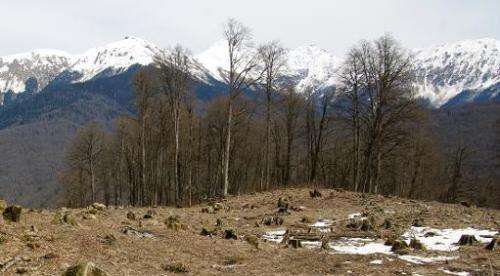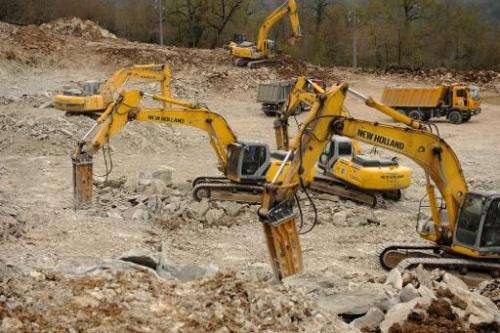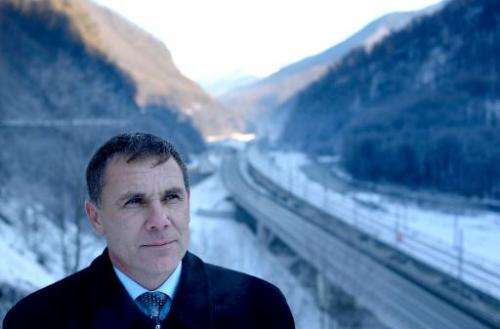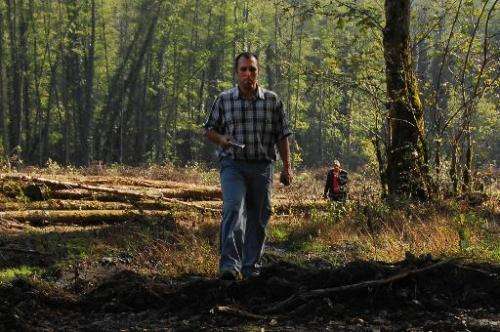Environment loses out in Russia's race to Sochi

Just outside the Olympic Park in Sochi, where the Winter Games open on Friday, is a green space with benches, artificial ponds and a couple of hides. "Ornithological Park", the sign declares.
The problem is that there is not a bird in sight in the park, which was set up as a replacement for sensitive wetlands that were covered over for the construction of Games venues.
"It's a profanation," said Vladimir Zubakin, president of the Russian Bird Union, of the so-called park.
Criss-crossed by disused irrigation canals, the wetlands were a paradise for up to 65 species of birds including vulnerable Dalmatian pelicans that migrated here for the winter.
Today, the former wetlands lie buried under two metres (6.5 feet) of crushed rock, used to strengthen the spongy ground for the vast Olympic project championed by Russian President Vladimir Putin.
"They have been lost to the Olympic steamroller," said Zubakin. "They say it looks pretty now, but birds actually prefer mud."
A year ago, Dmitry Chernyshenko, the head of the organising committee for Russia's Winter Olympics, made a proud boast that the games would be "green" and even improve Sochi's environment.
"We are delivering the green games… (and) dramatically enhancing the environmental situation," Chernyshenko said. "This is new to our country. This is the first step to demonstrate that you can build an environment in harmony with nature."
However many environmentalists bitterly reject such talk, bemoaning wrecked habitat, destroyed wildlife populations and bungled attempts to remedy the consequences of a massive programme to ready Sochi for Friday's opening ceremony.
'A huge task'
Olympstroi, the state corporation overseeing the Olympic construction programme, acknowledges that the work has affected a massive area of Sochi National Park—3,500 hectares (8,750 acres) in all—but insists that every effort has been made to avoid damage to the environment.
Gleb Vatletsov, head of the company's environmental department, said some proposed venues were ruled out, and some rare species were moved away from certain ski sites.
In addition to setting up the Ornithological Park, Olympic contractors planted 1.5 million new trees—three for every one that was cut down in the Sochi National Park to make way for Olympic sites.

"It was a huge task… we are not ashamed to talk about it," Vatletsov told AFP.
Zoologist Suren Gazaryan, a member of a regional green group, Environmental Watch on North Caucasus, said much of the planting programme had been "pointless".
The planting could never substitute for the loss of established forest, which is a complex ecosystem, Gazaryan said.
"If they planted a forest in an open field of a thousand hectares (2,500 acres), then yes, it could theoretically be adequate," he said.
"But in any case, these are ecosystems, not a Lego set that you take apart and then rebuild somewhere else."
Many plantings were done "by unqualified employees with large-scale violations" of methodology, the environment ministry watchdog said in a court decision last year, adding that tens of thousands of rare trees that were planted as compensation were "irreparably lost".
Moreover, certain reptiles and brown bears are no longer present in the area around the mountain venues, according to official reports by Sochi National Park.
'The river is the biggest shame'
Another hotly contested issue is the fate of the Mzymta, Sochi's largest river, which flows from a lake in a Caucasus reserve down to the Black Sea.
A road and a railway were built along its undeveloped left bank, connecting Sochi's airport with Olympic skiing venues upstream.
Of the damage done to Sochi's wilderness, "the river is the biggest shame," said Igor Chestin, head of WWF in Russia.

The river is the spawning site of one-fifth of Russia's valuable Black Sea salmon.
"Its value as a fishery has been lost due to the change of the shape of the river, and years of pollution" since Sochi was picked as the 2014 Winter Olympics host in 2007, Chestin said.
Geologist Yevgeny Vitishko, another activist with Environmental Watch, said the rugged topography of the area had required a system of tunnels and bridges for the road and rail network. "About 15 years" would have been needed for proper study and building, he told AFP.
During the years of preparation, the Games organisers released millions of trout hatchlings into the river in several batches.
But an official monitoring report last year found no evidence that any of the fish had survived.

It said much of the Mzymta had been transformed from a clean, white-water river into a controlled waterway, tainted by chemical pollutants and debris.
Russian officials have brushed aside most of the criticism. Deputy Environment Minister Rinat Gizatulin recently advised green activists to "stop tying themselves to every tree" in Sochi and instead appreciate the new gas-fired heating plant and sewage treatment facilities.
Meanwhile activists Gazaryan and Vitishko have both been made to feel the force of the law after being convicted for property damage following a protest over a residence allegedly belonging to the local governor.
Gazaryan, who spoke to AFP from Tallinn, has since claimed asylum in Estonia. Vitishko was ordered to serve a three-year sentence in a penal colony and is currently free pending appeal.
© 2014 AFP


















